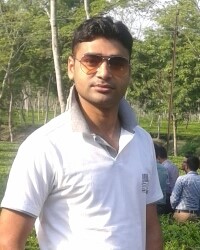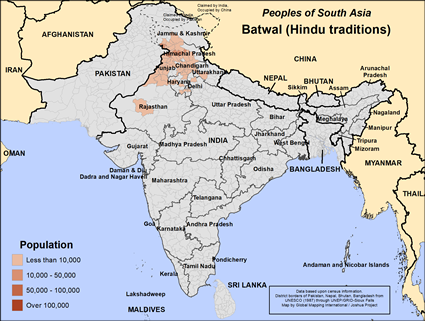Batwal (Hindu traditions) in India

Photo Source:
Anonymous
|

Map Source:
People Group data: Omid. Map geography: UNESCO / GMI. Map Design: Joshua Project.
|
| People Name: | Batwal (Hindu traditions) |
| Country: | India |
| 10/40 Window: | Yes |
| Population: | 83,000 |
| World Population: | 83,000 |
| Primary Language: | Dogri |
| Primary Religion: | Hinduism |
| Christian Adherents: | 0.00 % |
| Evangelicals: | 0.00 % |
| Scripture: | Complete Bible |
| Ministry Resources: | Yes |
| Jesus Film: | Yes |
| Audio Recordings: | Yes |
| People Cluster: | South Asia Dalit - other |
| Affinity Bloc: | South Asian Peoples |
| Progress Level: |
|
Introduction / History
The Batwal people of Punjab trace their ancestry to the Kashmir Valley in north India. The word 'Batwal' in Punjabi means literally "the inhabitants of valley." The community provided the traditional watchmen for the villages of the Punjab. According to the community's own tradition, the Batwal people were forced to flee their settlements when India was attacked by Alexander the Great. Once the Greek armies retreated, the Batwal people found that their neighbors had seized their lands and they were forced to become village watchmen. For many generations they had two roles:village watchmen, and those who summoned the village for work. During colonial days many were allocated land by British authorities, and this caused a transformation towards becoming farmers. Some believe that the Batwal people were tied to the land by Dogra landowners, and the word 'Bat' in the Dogri language means someone who is bonded. They were for generations bonded to particular families of Dogra as serfs. Like other communities of similar status, the Batwal people have been granted Scheduled Caste status, which allows them to avail a number of affirmative action plans by the government of India.
What Are Their Lives Like?
Many rural Batwal people have started to migrate to towns and cities. The main occupations of the Batwal are agriculture, government jobs, transport, trade and commerce. The Batwal people are divided into 13 clans. Like other neighboring Hindu communities, the Batwal are strictly exogamous, never marrying within the clan. The Batwal people share the customs and traditions of the locally dominant Dogra ethnic group and speak Dogri. The Batwal community have produced a renowned Punjabi singer from Punjab, India, popularly known as Lal Chand Yamla.
What Are Their Beliefs?
The Batwal consider themselves to be Hindus. Each Batwal clan has its male deity and gods. Once a year, the members of each clan organize congregations at their temples before which they prostrate themselves, each head of a family sacrificing a goat in honor of his eldest son. A huge segment of Batwal people worship Sri Guru Gyagi Ji Maharaj and follow his teachings. Every year they celebrate his birthday with enthusiasm. Most Batwal people have been strongly influenced by the Arya Samaj Movement, while some Batwal have come under the influence of other Hindu reformist sects.
What Are Their Needs?
The Batwal community people are economically impoverished. The government of India in 1994 ordered the Planning Commission of India to undertake an ethnographic study. Unfortunately, no steps have yet been taken by the government to enhance the economic position of the Batwal community. The Batwal need to hear and understand the good news about Jesus Christ. He alone can forgive their sins and give them eternal life.
Prayer Points
Pray for a spiritual desire to come to the Batwal so that they will seek and find the Holy One of God, Jesus Christ. Pray that answers to prayer will give the Batwal a thirst to know more about the Lord Jesus. Pray for believers to go to the Batwal people and help them with both their physical and spiritual needs. Pray for a disciple making movement to Christ among the Batwal people in this decade.